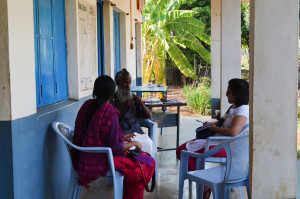Serious human rights violations occur across the world on a daily basis, yet very few, if any, are reported, either in the international media, academia or in the public sphere more generally. Fact finding missions allow for these violations to be documented and publicised and therefore create a space where human rights violations can be exposed and hopefully, in the future, prevented.
The activists from the Initiative on a fact finding mission to Chhattisgarh
Undertaking fact finding missions is a key strategy of the Reproductive Rights Initiative. The Initiative has conducted numerous fact findings in thirteen Indian states since 2011. Fact finding reports are used by the Initiative to support legal and social interventions on a wide range of reproductive and sexual rights. The Initiative has coordinated fact findings on subjects as diverse as the international surrogacy industry, child marriage, unsafe and unlawful sterilization and medical services available to pregnant and lactating homeless women. By working closely with local activists, advocates and NGOs, the Initiative ensures that its fact findings are as accurate, informative and reliable as possible. The Initiative has successfully utilised fact finding reports as evidence of human rights violations in the Indian courts and as advocacy tools to show the need for higher standards of reproductive and sexual rights.
Research & Fact-finding
Infant Mortality and Indian Public Health Standards: Fact-Finding Mission in Banki, Odisha
Maternal Health, Odisha, Research and Fact Finding, Update
In terms of the Human Development Index, the state of Odisha ranks at the bottom 22nd position (out of 23), and, according to the Planning Commission’s Tendulkar Committee Report 2009, the poverty headcount ratio of Odisha at 57.2 percent is the worst among all Indian states and
....
Read More.
Report on Maternal Mortality and Indian Public Health Standards, Balasore, Odisha
Maternal Health, Odisha, Research and Fact Finding, Update
According to a 2013 report on reproductive, maternal, newborn, child and adolescent health, conducted by the Ministry of Health & Family Welfare (MoHFW) in 2013, “there are still 56,000 maternal deaths each year. About two-thirds of maternal deaths occur in just a few states – Assam,
....
Read More.
Indian Public Health Standards & Right to Health: A Case Study of Raga Primary Health Centre
Arunachal Pradesh, Maternal Health, Research and Fact Finding, Update
Amongst the various persisting health problems in India, one of the most pressing – both as a public health and as a human rights issue – is the lack of equal access to basic healthcare facilities. Despite a considerable progress, newly introduced government programmes and schemes
....
Read More.
Indian Public Health Standards & Right to Health: A Case Study of Ziro District Hospital
Arunachal Pradesh, Research and Fact Finding, Update
“For a middle-income country of its stature and level of development, the rate of maternal deaths in India is shocking, raising multiple human rights issues” ..Paul Hunt, Special Rapporteur, Mission to India
One of India’s most remote States, Arunachal Pradesh is also one of
....
Read More.
Situational Analysis of Child Marriages in Assam
Assam, Child Marriage, Research and Fact Finding
The issue of child marriage is one of the emerging concerns among the developing countries. According to the 2001 census there are 1.5 million girls, in India, under the age of 15 already married.
Ignorance, illiteracy, poor health, economic and social backwardness, social practices and
....
Read More.
Litigation
- Presentations from the Two Day Webinar on Reproductive Rights on 23rd & 24th of May, 2020
- Patna High Court: Ration facility for all transgender persons
- Nikhil Datar vs. Union of India: A long drawn struggle
- Patna High Court gives favourable order in response to the PIL on water logging in the state
- Guwahati High Court delivers landmark judgement; Department of Health and Family Welfare to pay Twenty Five Lakh Rupees to Petitioner in Nagaland
Fact Finding
- Presentations from the Two Day Webinar on Reproductive Rights on 23rd & 24th of May, 2020
- Report on the State level Consultation in Arunachal Pradesh on 2nd & 3rd November, 2019
- Sexual and Reproductive Health Rights Dictionary
News
- Report of the two day webinar on ‘Access to Reproductive Justice’ on 23rd & 24th May, 2020
- Report of the National level consultation on Trans people and women’s issues- 28th & 29th December, 2019
- Nikhil Datar vs. Union of India: A long drawn struggle






